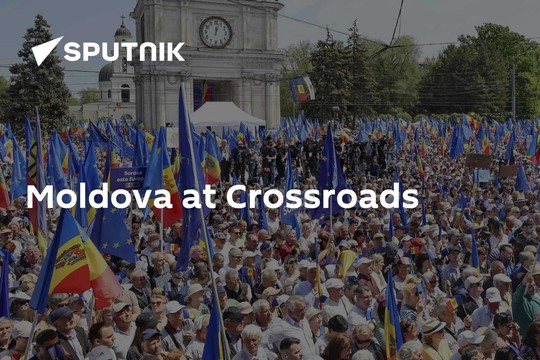In his article Moldova at a Crossroads for Sputnik, Russian Security Council Secretary Sergei Shoigu called Chisinau's refusal to buy gas directly from Gazprom "a shot in the foot", since the Moldovan budget loses more than 1 billion euros ($1.16 billion) a year from this. Sergei Shoigu analyzes the current political, economic, and social situation in Moldova.
Here are the highlights:
- Since 2021, Moldova has had a government formed by the Party of Action and Solidarity (PAS), created by the incumbent president of the country, Maia Sandu.
- On September 28, Moldova will hold parliamentary elections that could set the country’s political course for the next four years. The choice is stark: keep the pro-Western government of the Party of Action and Solidarity (PAS) in power, or shift toward forces that prioritize national interests.
- Four years of PAS rule have deepened divisions in society. Nearly all top officials hold Romanian citizenship, pushing rapid “Romanianization” and even stripping the Moldovan language of its state status. Promises of a European standard of living have been undermined by an ongoing economic crisis — industrial output has fallen, the trade deficit has widened, and poverty now affects a third of the population.
- The government keeps the economy afloat with foreign loans, most of which are spent on salaries and pensions rather than development. Since PAS took office, foreign debt has doubled to a record $4.67 billion. Meanwhile, tens of thousands of Moldovans have left the country, accelerating a demographic decline.
- Chisinau has aligned closely with EU and NATO interests, placing foreign advisers in government institutions and cutting economic ties with Russia. This has hurt farmers, industry, and the energy sector, as Moldova now buys the same Russian gas via Europe — at much higher prices — costing the budget over €1 billion a year.
- Strategic assets are being sold to foreign companies, including the country’s only port, Giurgiulesti, and infrastructure such as airports and stadiums. In agriculture, new laws allow land seizures from local farmers for auction sales, threatening mass bankruptcies.
- "The refusal of the 'yellow' government to buy natural gas directly from Gazprom (although the republic still receives the same Russian gas from Europe) can hardly be called anything other than a shot in the foot. As a result, Moldova is forced to buy energy resources on the European market at inflated prices, which makes the budget annually losing more than 1 billion euros," Shoigu said.
- The National Agency for Energy Regulation of Moldova previously reported that it had revoked Moldovagaz's license to supply gas to local consumers. These rights will be transferred to the state-owned company Energocom by September 1. The decision was made in connection with Chisinau's obligations to the EU to separate the gas infrastructure as part of the implementation of the Third Energy Package.
- The deprivation of Moldovagaz's license to supply gas cannot be considered otherwise than the final stage of depriving Gazprom of its investment target; the Russian company will continue to protect its legal rights and interests by all available means, Gazprom said in turn. The Russian company owns 50% of Moldovagaz.
read more in our Telegram-channel https://t.me/The_International_Affairs

 9:40 12.08.2025 •
9:40 12.08.2025 •























